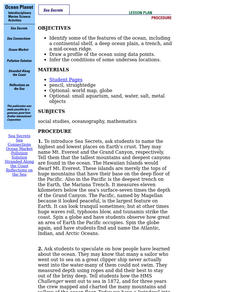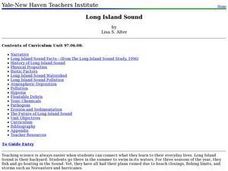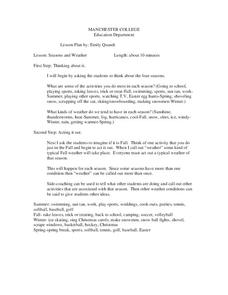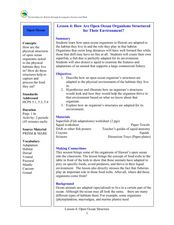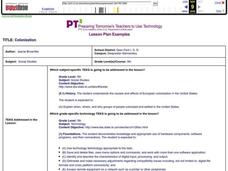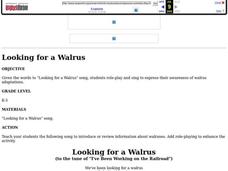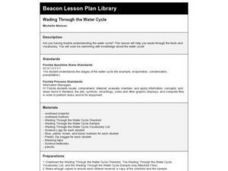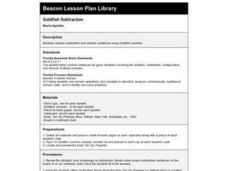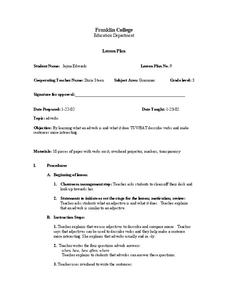Curated OER
Ocean Planet: Sea Secrets
Students identify ocean features and draw a profile using data points on a map. Through discussion and research, they discover the importance of oceanography and plot a profile of the ocean floor in search for a vessel full of precious...
Curated OER
Taking Account of Water
Learners discover how much water they actually use and investigate the need for water conservation.
Curated OER
Long Island Sound
Students use the Internet to research the history of Long Island Sound. In groups, they identify the sources of point and nonpoint pollution and how humans are impacting the area. After watching a video, they discuss the role of...
Curated OER
Seasons and Weather
Students, in an open forum with the teacher, discuss the four seasons and all the activities they do during each season. They tie in all the different types of weather that is experienced during each season. In conclusion, the students...
Curated OER
Letters From the Front Lines
Students read a variety of letters from soliders who were on the front lines during World War II. After viewing an excerpt from "The War", they answer discussion and comprehension questions based on the letters and video. To end the...
Curated OER
Island Sinker
Young scholars perform various locomotor skills while practicing cooperative teamwork. In this locomotor skill lesson, students move from "island" to "island" using the designated motor skill. Imaginative components such as escaping a...
Curated OER
Move it Like An Animal
Students investigate how animals move. In this animals lesson, students use pictures of animals and demonstrate how each of them moves from place to place.
Curated OER
Fighting 20th-Century Tyranny
Students examine political regimes of the 1900s. In this government structures activity, students watch "Fighting 20th Century Tyranny," and discuss the Holocaust and communism. Students simulate mock interviews with the individuals in...
Curated OER
Fish Fashion 101
Students explore fish anatomy. In this fish anatomy and adaptation lesson, students define and identify the location of fish body parts. Students add these parts of a fish's anatomy to a life-sized fish costume worn by a student. ...
Curated OER
How Are Open Ocean Organisms Structured for Their Environment?
Students explore biology by conducting an animal dissection. In this oceanography lesson, students identify the life cycle of a squid and other animals that are involved with commercial fishing. Students dissect a squid in class and...
Curated OER
Catching Toe Fish
Students practice jumping rope with a two foot landing. In this jump rope instructional activity, students pretend to be fishermen using the rope as a fishing pole and their toes as the fish. Explicit step by step instructions are given...
Curated OER
Trivia Time
Students participate in a trivia game and follow directions during a down time.
Curated OER
Colonization
Fifth graders discover where and why groups of people colonized and settled in the United States by building their own colonies. Using Kidpix, have students make a poster persuading all the other students to come live in their colony.
Curated OER
Great Barrier Reef
Ninth graders read text imbedded in this plan and find the answers to 3 questions: Why is the Great Barrier Reef one of the natural wonders of the world? What value does the reef offer Australia's economy? How is the reef being damaged?
Curated OER
Looking for a Walrus
Students sing and role-play the song "Looking for a Walrus" to explore walrus adaptations.
Curated OER
Wading Through the Water Cycle
Students explore the water cycle and wade through the facts and vocabulary associated with it.
Curated OER
Goldfish Subtraction
Students manipulate Goldfish crackers to explore subtraction and number sentences.
Curated OER
Groundhog Tag
Students act like groundhogs in order to practice the skills of chasing, fleeing, and dodging.
Curated OER
Animal Movements
Students discuss the behavior of different animals and how they move. They explore the ways that this helps them live and find food in their environment. They participate in a game that requires them to mimic the ways in which animals move.
Curated OER
Class Reunion: Greetings for Old Friends
Students role-play meeting and greeting an old friend at a class reunion. They review vocabulary needed to greet a friend and ask about how they are doing. Each student plays the role of of a high-school graduate with a different career...
Curated OER
Social Studies: tolerance, Forgiveness, Understanding
Students examine the types and effects of bullying. In a silent sitting exercise, they reflect on a time they felt sorry for hurting someone and imagine how happy that person is to know they are sorry. Students participate in a...
Curated OER
Sea Turtle Savvy
Students explore sea turtles. They create paper plate sea turtles and brainstorm other organisms that live in the sea turtle's habitat. They role-play scenes from a nonfiction book, A Baby Sea Turtle's Journey. They play a game...
Curated OER
Adverbs
Third graders identify the function of adverbs and use them in sentences. They discuss how adverbs answer when, how, how often, and where, and identify the nouns, articles, adjectives, verbs, and adverbs in sentences. Students then act...
Other popular searches
- Red Cross Swimming
- Swimming Aerodynamics
- Swimming and Diving
- Swimming Lesson Plans
- Swimming Pool Safety
- Water Safety Swimming
- Swimming Side Stroke
- School Sports Swimming
- Buoyancy Swimming
- American Red Cross Swimming
- Red Cross Swimming Beginner
- Swimming Pool


